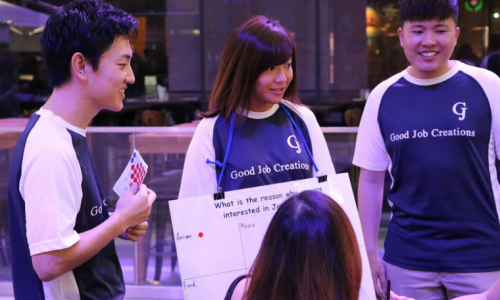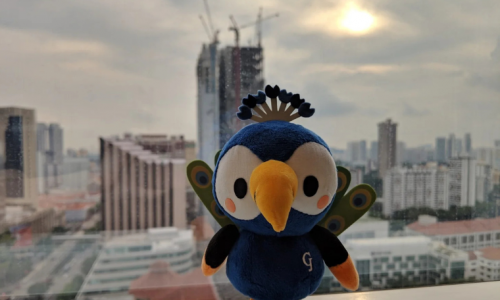Singapore has a unique culture, and characteristics can sometimes be complex for foreigners to understand, and expatriates can be confused. In this article, we’ve compiled 10 distinct aspects of Singaporean culture and characteristics, along with key tips on how to build good relationships with Singaporeans.
If you’re considering relocating or seeking a job in Singapore, this information could be useful. For those interested in working in Singapore, we encourage you to take advantage of the local recruitment agency, Good Job Creations, which also offers free consultations!
Communication with Singaporeans
1.Don’t be surprised if English doesn’t sound like English!
One of the first challenges for expatriates when they arrive in Singapore is undoubtedly understanding “Singlish.” Singlish is a heavily accented form of English spoken by Singaporeans. It’s often said that even native English speakers can struggle to understand it at times.
At first, you might not even realize that they are speaking English. However, once you get used to it, you might find that it’s surprisingly easy to understand. Even if you can’t catch everything, take it in stride, and enjoy the conversation with a spirit of mutual understanding!
2. Don’t be surprised if Chinese suddenly gets mixed into the conversation.
You might be concentrating hard, thinking you can’t understand because of the strong accent, only to realise they’ve switched to Mandarin Chinese (or Malay or Tamil) halfway through the conversation.
With the Chinese making up 70% of Singapore’s population, most people there are bilingual in Chinese and English. Although they will naturally speak to foreigners in English, the conversation may switch to Chinese once things get lively. So, if you suddenly can’t follow the conversation, don’t panic. It’s not that you can’t understand Singlish – they’ve completely switched to a different language!
Tip: Try to communicate in English or Chinese as much as possible
It’s important to try speaking in English and make an effort to learn their language. Personally, I don’t speak any Chinese, but when I tried using just a single phrase, my colleagues were really happy. Since you’re working in Singapore, why not take this opportunity to immerse yourself and start learning both English and Chinese?

Learning their language is also an effective way to build rapport.
Singapore Office Culture
- Don’t be surprised if a lion dance suddenly appears in the office.
In January or February, you might find a lion dance in the office without prior staff notice. Suddenly, you’ll notice an extravagant lunch set up in the lobby, and a lion dance performance will begin.
During the Lunar New Year (Spring Festival) season, the city is filled with a celebratory atmosphere. In English, this is called the “Lion Dance. “It’s a great opportunity to take surreal photos; if you upload them to social media, you’ll get plenty of likes!
2. Don’t be surprised if your colleague’s name suddenly changes.
One day, a colleague sitting next to you might say, “From today, call me Amanda.” You may ask, “Why the sudden change?” and they might reply with, “Well, my sales weren’t doing great, so it must’ve been because of my old name. That’s why I changed it!” Many Chinese Singaporeans have a deep belief in Feng Shui. Changing one’s name to improve sales or luck is completely normal. When this happens, just respond with, “That’s a great name!” and a confident smile.
3. Don’t be surprised if you’re told, “Come to work at 11:20 tomorrow.”
Even if your usual start time is 9:00 AM, you may suddenly be told, “Come in at 11:20 tomorrow, and don’t enter the office before that time.” It sounds oddly specific, doesn’t it? You’ve probably already guessed that Feng Shui is involved in this too. When this happens, don’t get frustrated thinking, “But I already scheduled a client meeting for that time!” Just go with the flow!
Point: Respect Singaporean Culture Even in the Workplace

Don’t be surprised if a lion dance suddenly appears in the office.
Singapore is often referred to as the “Country of Feng Shui,” as the practice of Feng Shui is very prevalent there. For example, the Merlion statue, which used to be located elsewhere, was moved to its current location because the original spot was considered Feng Shui-unfavorable.
Furthermore, Mr Lee Kuan Yew, the founding father of Singapore, also followed the advice of Feng Shui experts. He incorporated the Bagua, a symbol of good fortune, into the design of the one-dollar coin to ensure prosperity for all citizens.
You can sense Feng Shui and Chinese cultural influences throughout the office as well. Although I was initially confused when a colleague changed their name, it underscores the importance they place on Feng Shui beliefs.
Even though Singapore is a relatively young country, it has its unique cultural practices and customs. As foreigners working in Singapore, it is essential to respect the local culture and customs.
Fashion Differences Section

What is women’s fashion like in Singapore?
- Don’t be surprised if someone shows up at the office in a tight-fitting bodycon dress.
In Singapore, a country with a consistently hot climate, people generally dress lightly throughout the year. This is especially noticeable in women’s fashion. You might suddenly see someone wearing a bodycon dress that looks like it came straight out of the 1980s, especially with a very short hem. Bare legs are the norm due to the heat, so thick pants and stockings are rarely worn.
Initially, you might wonder if such attire is appropriate for a business setting, but no one seems to mind. This might be considered the standard in Singapore.
2. Don’t be surprised if a colleague suddenly has a lot of tattoos.
In Singapore, tattoos are quite common and often quite elaborate. For example, a host family member of mine in his 60s had tattoos all over his body. Despite his tattoos, he didn’t try to hide them; a dragon tattoo could even be seen peeking out from under his tank top.
While tattoos might be hidden under formal wear during work hours, you might be surprised by the extent of their tattooing in casual settings.
Tip: To fit in, dress like the locals.
When working abroad, you might wonder what kind of attire is appropriate. It’s said that people form impressions within the first 10 seconds of meeting, so appearance can significantly impact how you are perceived.
In Singapore, dressing in a way that aligns with local fashion and customs is important.
Personally, while I usually wear cropped pants from Uniqlo, I once wore a bodycon dress for a special occasion, and my colleagues were very impressed. They praised me, saying it suited me well. Although I only wore it once due to embarrassment, it was clear that matching local styles was appreciated.
Work Values
- Don’t be surprised if someone says they’ll be late because it’s raining.
Singapore often experiences sudden changes in weather, with forecasts like “sunny, then cloudy, and occasional rain” being common. The rain can be intense enough to make travel very difficult, and umbrellas often aren’t sufficient.
Surprisingly, even if you’re late due to rain, it’s usually accepted with understanding. People in Singapore are generally more lenient about such delays compared to Japan.
Even though it might be an unusual reason for delay, try to adopt a tolerant attitude if someone says they’re late because of the rain.

Don’t be surprised if someone says they’ll be late because it’s raining.
- Don’t be surprised if people around you keep changing jobs.
Singapore’s job market resembles a bubble economy, with a strong market in favour of employees. It’s common for people to switch jobs frequently to advance their careers. Many young professionals change jobs every 1-2 years. For instance, in the company where I worked, almost everyone had changed positions within a year.
2. Don’t be surprised if someone says their motivation for changing jobs is salary.
When asked about their motivation for changing jobs, Singaporeans often respond with a straightforward answer: “I want a better salary.”
Summary
Over the past two articles, we’ve covered 10 key points for adapting to Singaporean workplaces. Adjusting to cultural and work value differences is inevitable when working abroad. While it can be challenging, maintaining a mindset of understanding rather than frustration is crucial.
Singapore may initially seem confusing with its unique culture and characteristics, but it is an environment where many expatriates find living comfortable. The country’s good security, high salaries, and excellent living conditions make it a popular choice for relocation and career changes.
If you’re interested in moving to or working in Singapore, using a recruitment agency knowledgeable about the local market, such as Good Job Creations, is highly recommended. They offer comprehensive support from job searching to relocation, with free consultations available.
For more information, check out:
For those interested in moving to Singapore, we also recommend reading:
- Benefits and Considerations for Relocating or Changing Jobs in Singapore: Visa and Conditions Explained
Writer Introduction

Joined a management consulting firm as a new graduate. Subsequently, worked in Singapore as a local hire, involved in recruitment tasks. After working on job placement for Japanese professionals overseas and supporting foreign talent seeking employment in Japan, became independent. Currently working as a freelancer, providing recruitment support and working as a writer.





